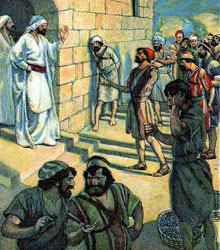
When Peter asked Jesus a question about how often he should forgive his brother, Jesus answered and told him to forgive his brother “seventy times seven” times (Matthew 18:21-22). His point was not that we should keep a record of the number of times we forgive someone and then after the four hundred and ninetieth time we refuse to forgive them again. Instead, Jesus’ point was that we should always be ready to forgive.
After Jesus answered, He used a parable to explain His answer. In the parable, He showed that we must forgive because we have been forgiven. There are several lessons to be learned from this parable about forgiveness.
Continue Reading
 “For the kingdom of heaven is like a landowner who went out early in the morning to hire laborers for his vineyard. When he had agreed with the laborers for a denarius for the day, he sent them into his vineyard.
“For the kingdom of heaven is like a landowner who went out early in the morning to hire laborers for his vineyard. When he had agreed with the laborers for a denarius for the day, he sent them into his vineyard.









